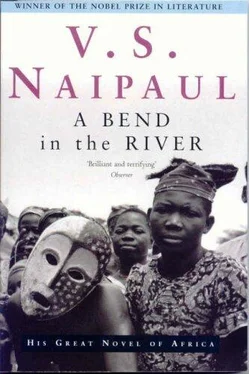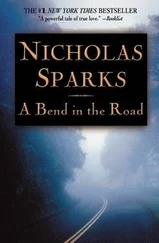V. Naipaul - A bend in the river
Здесь есть возможность читать онлайн «V. Naipaul - A bend in the river» весь текст электронной книги совершенно бесплатно (целиком полную версию без сокращений). В некоторых случаях можно слушать аудио, скачать через торрент в формате fb2 и присутствует краткое содержание. Год выпуска: 1989, ISBN: 1989, Издательство: Vintage, Жанр: Современная проза, на английском языке. Описание произведения, (предисловие) а так же отзывы посетителей доступны на портале библиотеки ЛибКат.
- Название:A bend in the river
- Автор:
- Издательство:Vintage
- Жанр:
- Год:1989
- ISBN:978-0679722021
- Рейтинг книги:5 / 5. Голосов: 1
-
Избранное:Добавить в избранное
- Отзывы:
-
Ваша оценка:
- 100
- 1
- 2
- 3
- 4
- 5
A bend in the river: краткое содержание, описание и аннотация
Предлагаем к чтению аннотацию, описание, краткое содержание или предисловие (зависит от того, что написал сам автор книги «A bend in the river»). Если вы не нашли необходимую информацию о книге — напишите в комментариях, мы постараемся отыскать её.
) V.S. Naipaul takes us deeply into the life of one man—an Indian who, uprooted by the bloody tides of Third World history, has come to live in an isolated town at the bend of a great river in a newly independent African nation. Naipaul gives us the most convincing and disturbing vision yet of what happens in a place caught between the dangerously alluring modern world and its own tenacious past and traditions.
A bend in the river — читать онлайн бесплатно полную книгу (весь текст) целиком
Ниже представлен текст книги, разбитый по страницам. Система сохранения места последней прочитанной страницы, позволяет с удобством читать онлайн бесплатно книгу «A bend in the river», без необходимости каждый раз заново искать на чём Вы остановились. Поставьте закладку, и сможете в любой момент перейти на страницу, на которой закончили чтение.
Интервал:
Закладка:
Kareisha, talking about Indar, touched me more than she knew. That idea of going home, of leaving, the idea of the other place--I had lived with it in various forms for many years. In Africa it had always been with me. In London, in my hotel room, I had allowed it on some nights to take me over. It was a deception. I saw now that it comforted only to weaken and destroy. That illumination I held on to, about the unity of experience and the illusion of pain, was part of the same way of feeling. We fell into it--people like Indar and myself--because it was the basis of our old way of life. But I had rejected that way of life--and just in time. In spite of the girls in the cigarette kiosks, that way of life no longer existed, in London or Africa. There could be no going back; there was nothing to go back to. We had become what the world outside had made us; we had to live in the world as it existed. The younger Indar was wiser. Use the airplane; trample on the past, as Indar had said he had trampled on the past. Get rid of that idea of the past; make the dream-like scenes of loss ordinary. That was the mood in which I left London and Kareisha, to go back to Africa, to wind up there, realise as much as I could of what I had. And make a fresh start somewhere else. I got to Brussels in the late afternoon. The plane for Africa was leaving from there at midnight. I felt afresh the drama of airplane travel: London vanished, Africa to come, Brussels now. I gave myself dinner and went to a bar afterwards, a place with women. All the excitement lay in the idea of the place rather than the place itself. What followed, some time later, was brief and meaningless and reassuring. It didn't lessen the value of what I had had in Africa: that was no delusion; that remained true. And it removed the special doubt I felt about my engagement to Kareisha, whom I had not yet even kissed. The woman, naked, unruffled, stood in front of a long mirror and looked at herself. Fat legs, roundish belly, chunky breasts. She said, "I've begun to do yoga with a group of friends. We have a teacher. Do you do yoga?" "I play a lot of squash." She paid no attention. "Our teacher says that a man's psychic fluids can overpower a woman. Our teacher says that after a dangerous encounter a woman can become herself again by clapping her hands hard or by taking a deep breath. Which method do you recommend?" "Clap your hands." She faced me as she might have faced her yoga teacher, drew herself up, half closed her eyes, pulled her outstretched arms back, and brought her hands violently together. At the sound, startling in the over-furnished little room, she opened her eyes, looked surprised, smiled is though she had been joking all along, and said, "_Go__!" When I was out in the street I took a deep breath, and vent straight to the airport to catch the midnight plane.
FOUR. BATTLE
CHAPTER 16
The dawn came suddenly, in the west pale blue, in the east red with thick horizontal bars of black cloud. And for many minutes it was like that. The scale, the splendour--six miles above the earth! We came down slowly, leaving the upper light. Below the heavy cloud Africa showed as a dark-green, wet-looking land. You could see that it was barely dawn down there; in the forests and creeks it would still be quite dark. The forested land went on and on. The sun struck the bottom of the clouds; it was light when we touched down. So at last I had come to the capital. It was a strange way to come to it, after such a roundabout journey. If I had come to it fresh from my upriver town it would have seemed immense, rich, a capital. But after Europe, and with London still close to me, it seemed flimsy in spite of its size, an echo of Europe, and like make-believe, at the end of all that forest. The more experienced among the European passengers, paying no attention to the big photograph of the President with his chief's stick, made a rush at the immigration and customs officials and appeared to force their way through. I wondered at their confidence, but they were mainly people with protection--embassy people, people working on government projects, people working for big companies. My own passage was slower. When I was through, the terminal building was almost empty. The airline posters and the photograph of the President had no one to look at them. Most of the officials had disappeared. And it was fully morning. It was a long drive into the town. It was like the drive, in my own town, from the Domain to the town centre. But the land was hillier here and everything was on a larger scale. The shanty towns and _cites__ (with the maize plantings between houses) were bigger; there were buses, even a railway train with old-fashioned open coaches; there were factories. All along the road were big boards about ten feet high, uniformly painted, each with a separate saying or maxim of the President. Some of the painted portraits of the President were literally as big as a house. We had had nothing like that in our town. Everything in our town, as I realized, was on a smaller scale. Portraits, maxims, occasional statues of the African madonna--they continued all the way to the hotel. If I had come to the capital fresh from our town I would have felt choked. But after Europe, and after what I had seen of the country from the air, and still with my sense of the flimsiness of the capital, my attitude was different, and I was surprised by it. There was to me an element of pathos in those maxims, portraits and statues, in this wish of a man of the bush to make himself big, and setting about it in such a crude way. I even felt a little sympathy for the man who was making such a display of himself. I understood now why so many of our later visitors at the Domain found our country, and our awe of the President, comic. What I saw on the road from the airport didn't seem comic, though. I felt it more as a shriek. I had just come from Europe; I had seen the real competition. Overnight I had changed one continent for another, and this odd sympathy for the President, this vision of the impossibility of what I thought he was trying to do, came just at the moment of arrival. The sympathy wore off as the town became more familiar and I began to see it as a larger version of my own town. The sympathy, in fact, began to wear off when I got to the new big hotel (air-conditioned, shops in the lobby, a swimming pool no one was using) and found it full of secret police. I can't imagine that they had much to do there. They were there to show themselves to visitors. And also because they liked being in the smart new hotel; they wanted to show themselves to visitors in that modern setting. It was pathetic; or you could make a joke of it. But those men weren't always funny. Already, then, the tensions of Africa were returning to me. This was the President's city. This was where he had grown up and where his mother had worked as a hotel maid. This was where, in colonial days, he had got his idea of Europe. The colonial city, more extensive than ours, with many residential areas rich with decorative, sheltering trees now rally grown, was still to be seen. It was with this Europe that, in his own buildings, the President wished to compete. The city, while decaying in the centre, with dirt roads and rubbish mounds just at the back of the great colonial boulevards, was yet full of new public works. Large areas near the river had been turned into Presidential reserves--palaces with great walls, gardens, state houses of various sorts. In the Presidential gardens near the rapids (the rapids here matching ours, a thousand miles upriver), the statue of the European explorer who had charted the river and used the first steamer had been replaced by a gigantic statue of an African tribesman with spear and shield, done in the modern African style; Father Huis-mans would have had no time for it. Beside this statue was a smaller one of an African madonna with a bowed, veiled head. Nearby were the graves of the earliest Europeans: a little dead settlement, out of which it had all grown, out of which our town had been seeded. Simple people, with simple trades and simple goods, but agents of Europe. Like the people who came now, like the people on the airplane. The rapids made a constant, unchanging noise. The water hyacinths, "the new thing in the river," beginning so far away, in the centre of the continent, bucked past in clumps and tangles and single vines, here almost at the end of their journey.
Читать дальшеИнтервал:
Закладка:
Похожие книги на «A bend in the river»
Представляем Вашему вниманию похожие книги на «A bend in the river» списком для выбора. Мы отобрали схожую по названию и смыслу литературу в надежде предоставить читателям больше вариантов отыскать новые, интересные, ещё непрочитанные произведения.
Обсуждение, отзывы о книге «A bend in the river» и просто собственные мнения читателей. Оставьте ваши комментарии, напишите, что Вы думаете о произведении, его смысле или главных героях. Укажите что конкретно понравилось, а что нет, и почему Вы так считаете.












